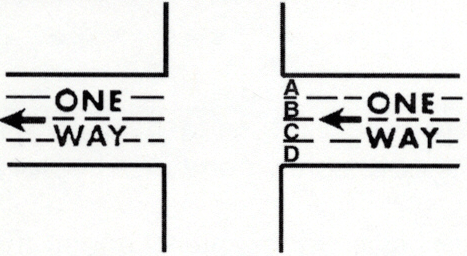IF TRAFFIC PREVENTS YOU FROM CROSSING ALL THE WAY ACROSS A SET OF RAILROAD TRACKS, YOU MAY ONLY DO SO ON THE OTHER SIDE IF THERE IS ROOM ON THE OTHER SIDE FOR YOUR VEHICLE.
TURN RIGHT FROM THE LANE NEAREST THE CURB OR EDGE OF THE ROADWAY ON A HIGHWAY WITH TWO LANES IN YOUR DIRECTION.
You're about to do a U-turn to the left. During the last 100 feet before the turn, you must continuously signal.
The statement is false.
Work zones are marked with black-on-orange signage.
Under no circumstances may you drive off the paved road to pass another car.
If you are involved in a traffic collision and the property damage exceeds $1,000 or there are any injuries, you must complete and submit a written report (SR1) to the DMV.
It is illegal to pass through any clearly posted no-passing zone.

While there are designated turn lanes, the correct lane to be in when making a right turn from a one-way roadway is letter A.
You're approaching a railroad crossing without any warning devices and can only see 400 feet in one direction down the tracks. The posted speed limit is 15 miles per hour.
Second statement is correct.
If you're driving up a narrow, steep road and come across a car that doesn't have enough room to pass, the other driver should pull over to the side of the road.
On a level street, your wheels must be within 18 inches of the curb when parking parallel to the curb.
To make a left turn from a multilane one-way street to a one-way street, begin in the lane closest to the left curb.
Second statement is the right answer.
You should be looking down the road about 10 to 15 seconds before your car arrives to avoid last-minute maneuvers.